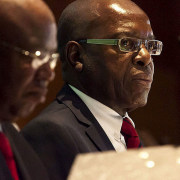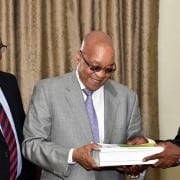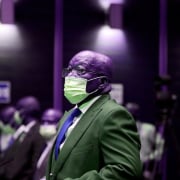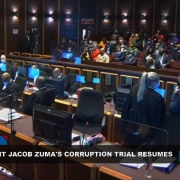|
Getting your Trinity Audio player ready...
|
 In this article Kameel Premhid, Helen Suzman Foundation intern, examines the major issues affecting the Arms Procurement Commission (APC) since its inception. The APC is the first time that the South African government has indicated that there was potential wrongdoing with the infamous Arms Deal. This is the first time that there exists a possibility to hold those involved in the deal accountable. However, this will not be possible if the APC continues to conduct itself in the way it has.
In this article Kameel Premhid, Helen Suzman Foundation intern, examines the major issues affecting the Arms Procurement Commission (APC) since its inception. The APC is the first time that the South African government has indicated that there was potential wrongdoing with the infamous Arms Deal. This is the first time that there exists a possibility to hold those involved in the deal accountable. However, this will not be possible if the APC continues to conduct itself in the way it has.
Background
The Arms Procurement Commission (APC) was established by President Zuma to investigate allegations of fraud and corruption, impropriety in the Strategic Defence Procurement Packages (link), commonly referred to as the Arms Deal. This was in response to an application before the Constitutional Court which sought to compel the President to establish the Commission (link). The application was filed by well known anti-arms campaigner Terry Crawford-Browne who has been at the forefront of a long-standing effort to bring more accountability and scrutiny to the Arms Deal (link).
The APC was officially announced by Minister of Justice Jeff Radebe, MP in Cape Town on 27 October 2011 (link).
Had the merits of the case been argued before the Court, the President ran the risk of being compelled to establish a Commission with a specified term of reference. Given the political sensitivity of the Arms Deal and the potential to cause significant public harm to those accused of wrongdoing (many of whom are high-ranking ANC officials, including the President himself), the President’s decision to establish the APC on his own terms was an understandable one.
The APC is chaired by Mr Justice Willie Seriti, of the Supreme Court of Appeal, who is assisted by two other Judges, Mr Justice Legodi of the North Gauteng High Court and Mr Justice Musi, Judge President of the Free State High Court (link). The APC has a professional staff compliment (mostly officials on secondment from the Department of Justice and Constitutional Development) as well as a legal unit consisting of senior and junior evidence leaders who are tasked to gather, study and put evidence to witnesses who made submissions to the APC.
The witnesses who have been called are: David Maynier, Patricia De Lille, Major General Meiring, Colonel Du Plooy, Paul Hoffman , Terry Crawford-Browne , R Young , Gavin Woods , Andrew Feinstein , Paul Holden, Raenette Taljaard and Fana Hlongwane (link).
APC suffers from resignation set-backs
Since the APC has commenced with its work, it has suffered a series of set-backs. Chief amongst those has been resignations from the APC.
One such resignation was that of senior investigator, attorney Norman Moabi. In his resignation letter, Moabi questioned Seriti’s impartiality and integrity, alleging that he was operating under a political agenda. Moabi attributed supposed damning quotes to Seriti that suggested that the APC would be used to silence critics of the Deal. Moabi was equally scathing about the APC’s work methodology accusing Seriti of micro-managing the process so that no independent work could be done (link).
Seriti has strongly disputed the claims emphasising that as a Senior Judge, he was fully aware of his oath of office and the importance of the task entrusted to him and his fellow Commissioners (link).
Tellingly, Seriti’s response elicited a further reply from Moabi. In it he stated he was willing to undergo a lie detector test to verify his claims. He went further and challenged Seriti, key APC staff and the evidence leaders (link) of the APC, who came to Seriti’s defence, to do the same (link).
To date the challenge has been rejected (link).
Irrespective of the validity of these competing claims, this debacle has seriously harmed public confidence in the APC. Commentators have been quick to note that it is the first time that someone of Moabi’s standing has gone so far to implicate a sitting Judge in potentially misleading the public. Given the seriousness of the claim and the personal risks involved, Moabi’s departure has undeniably undermined confidence in the APC.
Whilst an isolated incident may have been enough for the APC to recover from, a second resignation has recently come to light. The Sunday Times has reported (link) that Kate Painting is set to resign by Wednesday, March 13th. Even though Painting could not be reached for comment at the time of reporting, the Sunday Times indicates that the timing of her resignation and the prevailing circumstances at the APC could in some way explain her sudden departure.
Judge Seriti now faces the mammoth task of restoring public confidence in a process that is so vital to uncovering the truth of one of the most potentially corrupt deals that our government has ever engaged in.
Other problems
Whilst working with Paul Hoffman SC at the Institute for Accountability (IFAISA), the author was also subjected to certain questionable behavior on the part of the APC. Hoffman, who is representing Crawford-Browne, has gone on record pointing out the serious procedural and substantive issues that exist with the APC (link). The author has similarly also described his less than satisfactory treatment by the APC which was only reversed after the APC were threatened with legal action (link).
Whilst that dispute (surrounding the access to documents in possession of the APC) was resolved (link), other serious issues have emerged which jeopardise the APC’s ability to retain public confidence.
Postponement
One such issue is the three month delay to proceedings which the APC announced four days before its hearings were set to begin (link).
This official postponement is attributed to an increasing amount of evidence requiring further investigation, the need to possibly enjoin more witnesses to the process and the need to recruit greater specialist assistance (link).
However this justification remains unsatisfactory to many involved in the process considering that the APC has had 18 months in which to prepare for these hearings.
Rumours abound that this delay is a deliberate attempt to delay the work of the APC so as to stifle public opinion on the subject. Interestingly, others argue that the delay presents a unique opportunity for the APC to reconsider its method of calling witnesses and that during this intervening period other witnesses (mostly those linked to the ANC) should be called (link).
And the ANC?
The Mail and Guardian has carried further reports (link) on heated exchanges between Crawford-Browne and Judge Seriti on this very subject.
Crawford-Browne had written directly to Seriti insisting that the ANC be summoned to give evidence to the APC. Crawford-Browne alleges, as in his papers before the Constitutional Court (link), that the ANC has a prima facie case to answer. He says that given there are many concurrent multi-national investigations into the Arms Deal which indicate possible corruption on the ANC’s part and reams of evidence which suggest this, it is thus makes no sense why the ANC is not being called to testify.
Crawford-Browne quotes Andrew Feinstein (the former ANC MP who resigned due to his role in uncovering the corruption in the Deal) who alleges that it was revealed to him by a senior ANC figure that the ANC was able to fund the party’s 1999 election campaign through illegal kickbacks from the Deal (link).
In reply, William Baloyi, APC Spokesman, has stated that:
"Currently no evidence against the said organisation [ANC] has been brought to the attention of the commission … But this does not mean there is no information… Maybe it is information we can't disclose. Should evidence come to light the commission will investigate… We called for submissions and individuals and groups made submissions, and out of those submissions and other investigations we compiled a list of 12 individuals who would come for the first phase of the hearings. That is not a conclusive list … Investigations are still ongoing and our evidence leaders are meeting with other witnesses and implicated people." (link).
Crawford-Browne has rubbished these claims.
Comment
It is hoped that when the APC reconvenes, the APC will be able to carry out its work in accordance with its own motto: transparently and accountability under the rule of law (link).
Apart from needing to do so in order to ensure its own credibility, this is especially required of the APC given the possibility existing that any money spent – if found to be tainted by fraud and corruption – can be recouped (link).
In a country like ours, limiting the devastating effect of this wasteful expenditure (link) is essential to achieve the type of development envisioned by the NDP (link). If it is clearly demonstrated that the Arms Deal was mired in corruption, then a cash injection of the R70bn spent on the weapons would go a long way to making that possible.
A failure by the Commission will not only rob the South African public of the chance to be repaid for this expensive mistake, it will also rob us of the opportunity to put this damaging and painful issue behind us. Kameel Premhid – kameel@hsf.org.za









